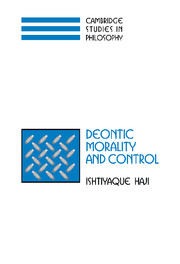Book contents
- Frontmatter
- Contents
- Acknowledgments
- 1 Introduction
- PART ONE DETERMINISM AND DEONTIC MORALITY
- 2 Obligation and Control
- 3 Frankfurt-Type Cases and Deontic Control
- 4 Control Requirements of Deontic Anchors: Some Objections
- 5 Determinism and Deontic Anchors
- PART TWO INDETERMINISM AND DEONTIC MORALITY
- PART THREE CONSEQUENCES OF BEING DEPRIVED OF DEONTIC ANCHORS
- Notes
- Glossary and List of Principles
- References
- Index
5 - Determinism and Deontic Anchors
Published online by Cambridge University Press: 23 July 2009
- Frontmatter
- Contents
- Acknowledgments
- 1 Introduction
- PART ONE DETERMINISM AND DEONTIC MORALITY
- 2 Obligation and Control
- 3 Frankfurt-Type Cases and Deontic Control
- 4 Control Requirements of Deontic Anchors: Some Objections
- 5 Determinism and Deontic Anchors
- PART TWO INDETERMINISM AND DEONTIC MORALITY
- PART THREE CONSEQUENCES OF BEING DEPRIVED OF DEONTIC ANCHORS
- Notes
- Glossary and List of Principles
- References
- Index
Summary
I have been preparing the way to initiate one of the principal arguments of this book. It can be summarized in this fashion. No one can perform an action that is right, wrong, or obligatory unless one could have done otherwise. As we have seen, this is because there is a requirement of alternative possibilities for deontic anchors. In addition, there are powerful reasons to believe that determinism is incompatible with anyone's ever having freedom to do otherwise. It follows, straightforwardly, that if determinism is true, then no act can instantiate a primary deontic property. This new incompatibility thesis – that determinism is incompatible with deontic morality – is the topic of this chapter.
It is noteworthy that this defense of the new incompatibility thesis, just like one prominent defense of the thesis that determinism is incompatible with moral responsibility, turns on the view that determinism expunges alternative possibilities. The cardinal elements of the most widely discussed line of reasoning over the past several years for the incompatibility of determinism and freedom to do otherwise are easy to grasp. As Peter van Inwagen explains in An Essay on Free Will:
If determinism is true, then our acts are the consequences of the laws of nature and events in the remote past. But it is not up to us what went on before we were born, and neither is it up to us what the laws of nature are. Therefore, the consequences of these things (including our present acts) are not up to us.
(1983: 16)- Type
- Chapter
- Information
- Deontic Morality and Control , pp. 59 - 84Publisher: Cambridge University PressPrint publication year: 2002

